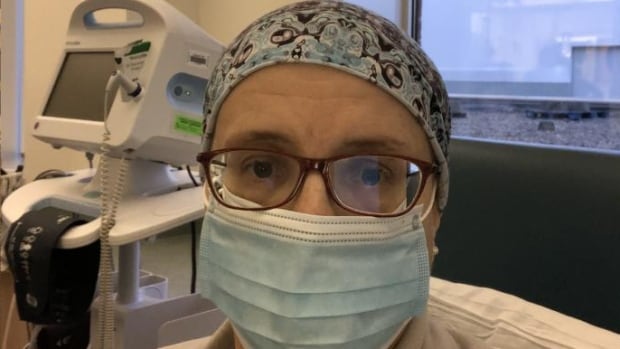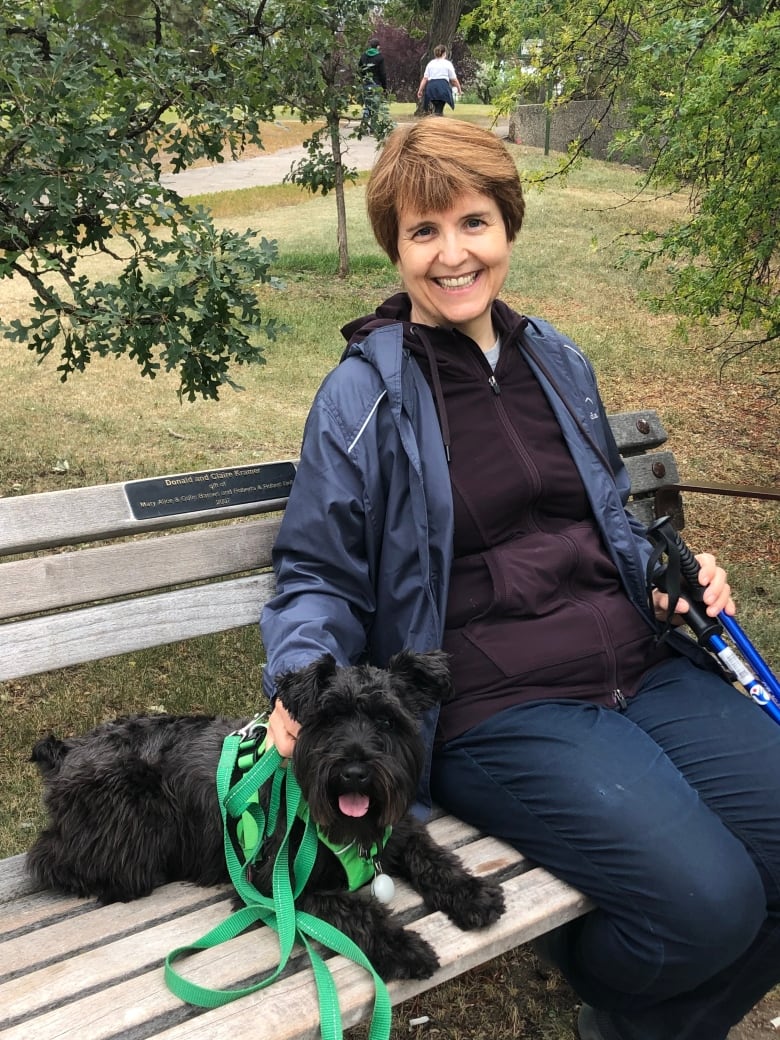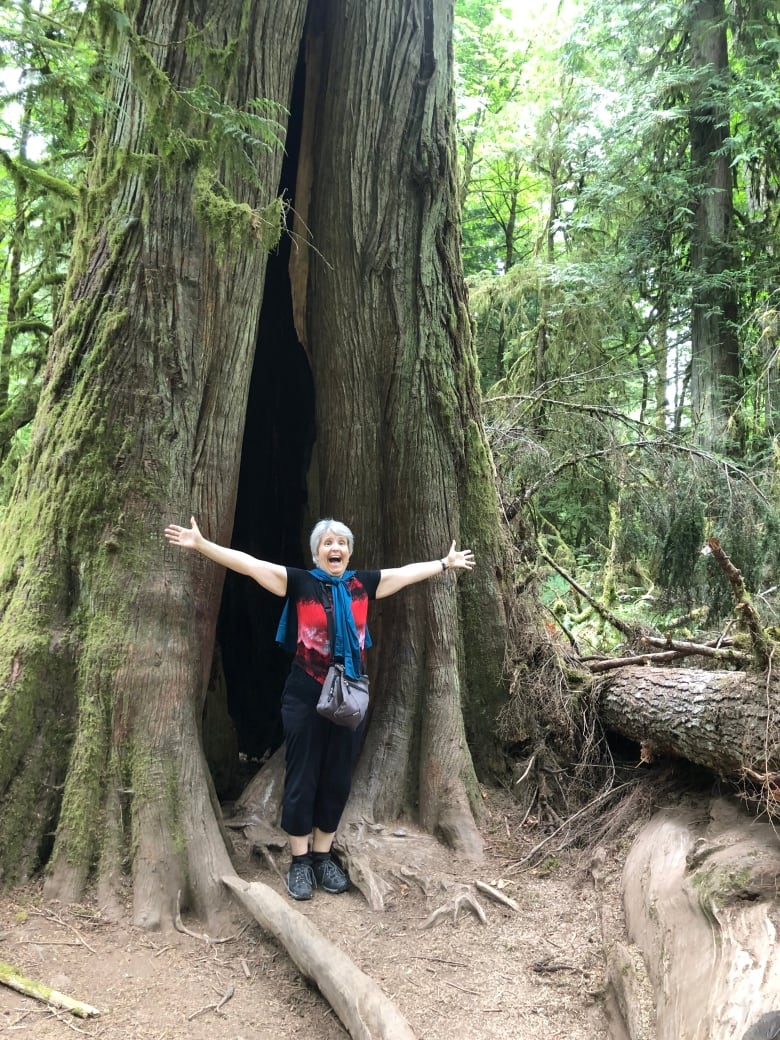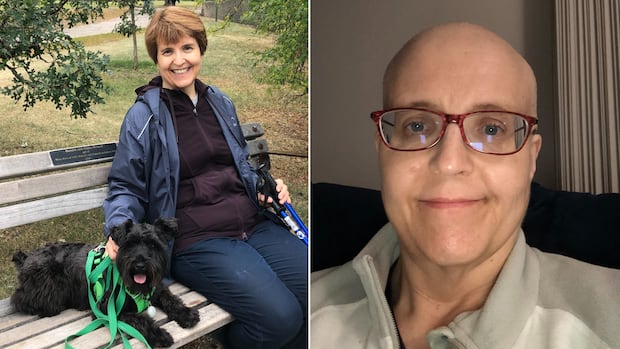
This First Person column is the experience of Barbara Reul, who lives in Regina. For more information about CBC’s First Person stories, please see the FAQ.
“Bad hair day or chemo?”
I was wearing a beautiful turban to cover my bald head on a Zoom call when I got this joking message from an acquaintance.
It hit me right in the gut.
I didn’t know how to react to that, so I just told the truth and replied, “Chemo.”
The person was mortified and apologetic.
Receiving a critical illness diagnosis is hard. For me, telling my family, friends and colleagues about the change in my health status was even harder.
What I didn’t expect or prepare for were to hear words of encouragement that were anything but helpful to me as a cancer survivor.

A crisis within a pandemic
A few years earlier, in July 2020, I received a sudden gynecological cancer diagnosis. While the world was grappling with a pandemic, I underwent major surgery, followed by chemo and radiation therapy that resulted in a plethora of nasty side effects.
Thanks to crippling fatigue, serious weight gain (who knew?) and awful bouts of chemo brain fog, I became an expert in pondering early retirement or death (whatever came first) practically overnight. Sadly, pandemic travel restrictions prevented my family and other friends and relatives from being present by my side.
Despite being cared for expertly by my wonderful “family of choice” in town, I resented having to navigate uncharted waters on my own as a middle-aged, single woman.
On top of it all, I was unprepared for comments that ranged from unhelpful (“It will be tough returning to work”) to rude (“No surprise, given your busy lifestyle”) and clueless (“It will be over before you know it”).
“What is wrong with people?” I remember asking my beloved twin sister during one of our frequent video chats.
“I don’t know,” she answered quietly while I wiped tears off my face.
“Why don’t you make it a teaching moment?” my sibling advised, which struck me as good point.
I began to compile a list of “What to say when you don’t know what to say” items after having finished treatments in March 2021.
When Barbara Reul was diagnosed with cancer, she had no idea the struggle that would come with telling people about her health journey. From thoughtless comments, to messages that she says were downright rude, here’s a few that have stuck with her and her tips on what to say instead.
Don’t offer advice of any kind. Unless you are part of a patient’s medical team or have specifically been asked for your input, let it go.
Don’t comment on physical appearances. Over the course of 12 long months, I scared myself silly every time I walked by a mirror or looked into a camera of sorts. Why? Because a very old, very fat and, at times, very bald lady who I didn’t recognize was staring me in the face. Enough said.
Don’t grieve someone else’s future for them. It’s not anyone else’s job to consult an inner crystal ball and paint a picture of what the rest of my life might look like. That’s for me to worry about.
Don’t tell someone’s story for them. Sharing details of another person’s health journey, and doing so without their consent, is never a good idea. Indiscretions of that kind would either make me burst into tears or eat Nutella by the spoonful.
Don’t assume someone’s health journey is over. Living with the fear of dying sooner than others is a fact of life for cancer survivors. That’s why I now try even harder to live every moment to the fullest.

My most meaningful experiences always involved people who showed me they care. I cherished verbal responses like “My heart goes out to you” and “That must have been so hard” because they show genuine empathy. I loved being part of other people’s lives (“Are you up for a walk around the lake today?”) while keeping my COVID bubble tiny for obvious reasons. After all, I wasn’t dead yet, just sick and trying to get better.
- Read more CBC First Person pieces here.
The gift of empathy
Whenever others thanked me for my insights and suggestions, I felt more empowered and appreciated than words can express.
That’s also when it dawned on me what an invaluable gift I had been given.
I had learned to effectively empathize with others and be more patient with myself at the same time.
As a cancer survivor in remission, I now try even harder to live every moment to the fullest, especially when my birthday rolls around in mid-August.
The intense joy and deep gratitude I felt this summer standing in front of the oldest tree in the Cathedral Grove at the MacMillan Provincial Park on Vancouver Island to mark the occasion is hard to describe.
I realize my health journey has been shaped by many wonderful beings — four-legged and otherwise — who helped me turn into a better version of myself (“Barb 2.0”).
I matter to them, in sickness and in health.
And for that I will always be grateful.
Do you have a compelling personal story that can bring understanding or help others? We want to hear from you. Here’s more info on how to pitch to us.
